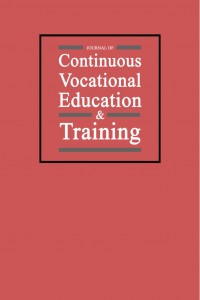Abstract
The gap between skills individuals have and skills required in labor market is called skills-mismatch. According to Manpower Group’s Talent Shortage Survey published in 2019, 54% of enterprises in Turkey cannot find qualified talent they are looking for, causing issues such as unemployment or inefficiency. When designed right, Vocational Education and Training can educate people on skills missing in the labor market. But this is possible only after correct identification of the skills missing. Purpose of this study is to uncover skills that employers think are missing in Turkish Labor Market and to guide future Vocational Education and Training policies. Employers’ opinions on this matter are reached by Ministry of Industry and Technology of Turkey in 2016, for their own project of Sectoral and Regional Mapping of Productivity and Development in Turkey via a survey conducted on 10063 enterprises. This paper will first analyze the current situation in Turkish Labor Markets and Vocational Education and Training Policies, followed by the presentation and analysis of survey results. In the end, these results will be discussed in light of other data and research done in this area.
References
- Adalet McGowan, M. and D. Andrews (2017), “Skills mismatch, productivity and policies: Evidence from the second wave of PIAAC”, OECD Economics Department Working Papers, No. 1403, OECD Publishing, Paris. http://dx.doi.org/10.1787/65dab7c6-en
- Atkinson, G., & Stanwick, J. (2016). Trends in VET: policy and participation. Adelaide: NCVER.
- CEDEFOP (2015). Tackling unemployment while addressing skill mismatch: lessons from policy and practice in European Union countries. Luxembourg: Publications Office. Cedefop research paper; No 46. http://dx.doi.org/10.2801/648140
- CEDEFOP (2017). European inventory on validation of non-formal and informal learning - Turkey - 2016,
- Centre Inffo (2016). Key competences in vocational education and training – France. Cedefop ReferNet thematic perspectives series. http://libserver.cedefop.europa.eu/vetelib/2016/ReferNet_FR_KC.pdf
- Cochran, W. G. (1950). The comparison of percentages in matched samples. Biometrika, 37(3/4), 256-266.
- ManpowerGroup (Firm). (2018). 2019 Talent Shortage Survey.
- Miner, R. (2014). The great Canadian skills mismatch: People without jobs, jobs without people and more. Miner Management Consultants.
- Organisation for Economic Co-operation and Development, & Organisation for Economic Co-operation and Development Staff. (2011). OECD employment outlook 2011. Paris: OECD Publishing.
- Ramsey, P. P., & Ramsey, P. H. (2004). Minimum sample sizes for Cochran’s test. Survey research methods, American Statistical Association. http://www. amstat. org/sections/srms/Proceedings/y1981. html. Accessed June.
- TÜİK (2020). Eğitim durumuna göre işgücü göstergeleri.
- TÜİK (2020). İşgücü İstatistikleri
- TÜRKİYE BÖLGESEL VE SEKTÖREL VERİMLİLİK GELİŞİM HARİTALARININ OLUŞTURULMASI PROJESİ SAHA ÇALIŞMASI ANALİZİ. T.C. Bilim, Sanayi ve Teknoloji Bakanlığı, Verimlilik Genel Müdürlüğü Raporu, (2018). https://docplayer.biz.tr/122551156-Turkiye-verimlilik-gelisim-haritasi.html
- Zira, E. (2016). The impact of skill mismatch on aggregate productivity: Cross-country analysis in OECD economies. Unpublished master’s thesis, KTH Industrial Engineering and Management, Stockholm, Sweden.
Abstract
Bireylerin sahip olduğu beceriler ile işgücü piyasasında ihtiyaç duyulan beceriler arasındaki farka beceri uyuşmazlığı denmektedir. Manpower Group’un 2019 yılında yayınladığı Yetenek Açığı Araştırması’na göre Türkiye’deki işletmelerin %54’ü aradıkları kalifiye işgücüne erişememektedir. Bu durum işsizlik ve verimsizlik gibi sorunlara sebep olmaktadır. Doğru tasarlandığında piyasada eksik olan beceriler işsiz bireylere mesleki ve teknik eğitim ile kazandırılabilir. Fakat bunun için öncelikle piyasada eksik olan becerilerin tespiti gereklidir. Bu çalışmanın amacı işverenlerin çalışanlarında ve Türkiye işgücü piyasalarında eksik olduğunu düşündükleri becerileri tespit etmektir. Çalışma gelecekteki mesleki ve teknik eğitim politikalarına ışık tutmayı hedeflemektedir. İşverenlerin bu alanlardaki fikirlerine, 2016 yılında Sanayi ve Teknoloji Bakanlığı’nın Türkiye Bölgesel ve Sektörel Verimlilik Gelişim Haritalarının Oluşturulması Projesi kapsamında 10063 işletme ile gerçekleştirdiği anket çalışması aracılığıyla erişilmiştir. Makale ilk olarak günümüz Türkiye İşgücü Piyasalarının ve sunulan mesleki ve teknik eğitimlerin durumunu anlatacak, daha sonra anket sonuçlarını sunacak ve analiz edecektir. Son bölümde ise bu bulgular daha önce yürütülen farklı çalışmalar ve veriler ışığında tartışılarak gelecekteki mesleki ve teknik eğitim politikaları için önerilerde bulunulacaktır.
References
- Adalet McGowan, M. and D. Andrews (2017), “Skills mismatch, productivity and policies: Evidence from the second wave of PIAAC”, OECD Economics Department Working Papers, No. 1403, OECD Publishing, Paris. http://dx.doi.org/10.1787/65dab7c6-en
- Atkinson, G., & Stanwick, J. (2016). Trends in VET: policy and participation. Adelaide: NCVER.
- CEDEFOP (2015). Tackling unemployment while addressing skill mismatch: lessons from policy and practice in European Union countries. Luxembourg: Publications Office. Cedefop research paper; No 46. http://dx.doi.org/10.2801/648140
- CEDEFOP (2017). European inventory on validation of non-formal and informal learning - Turkey - 2016,
- Centre Inffo (2016). Key competences in vocational education and training – France. Cedefop ReferNet thematic perspectives series. http://libserver.cedefop.europa.eu/vetelib/2016/ReferNet_FR_KC.pdf
- Cochran, W. G. (1950). The comparison of percentages in matched samples. Biometrika, 37(3/4), 256-266.
- ManpowerGroup (Firm). (2018). 2019 Talent Shortage Survey.
- Miner, R. (2014). The great Canadian skills mismatch: People without jobs, jobs without people and more. Miner Management Consultants.
- Organisation for Economic Co-operation and Development, & Organisation for Economic Co-operation and Development Staff. (2011). OECD employment outlook 2011. Paris: OECD Publishing.
- Ramsey, P. P., & Ramsey, P. H. (2004). Minimum sample sizes for Cochran’s test. Survey research methods, American Statistical Association. http://www. amstat. org/sections/srms/Proceedings/y1981. html. Accessed June.
- TÜİK (2020). Eğitim durumuna göre işgücü göstergeleri.
- TÜİK (2020). İşgücü İstatistikleri
- TÜRKİYE BÖLGESEL VE SEKTÖREL VERİMLİLİK GELİŞİM HARİTALARININ OLUŞTURULMASI PROJESİ SAHA ÇALIŞMASI ANALİZİ. T.C. Bilim, Sanayi ve Teknoloji Bakanlığı, Verimlilik Genel Müdürlüğü Raporu, (2018). https://docplayer.biz.tr/122551156-Turkiye-verimlilik-gelisim-haritasi.html
- Zira, E. (2016). The impact of skill mismatch on aggregate productivity: Cross-country analysis in OECD economies. Unpublished master’s thesis, KTH Industrial Engineering and Management, Stockholm, Sweden.
Details
| Primary Language | English |
|---|---|
| Subjects | Studies on Education |
| Journal Section | Digest |
| Authors | |
| Publication Date | May 9, 2020 |
| Submission Date | May 12, 2020 |
| Acceptance Date | July 17, 2020 |
| Published in Issue | Year 2020 Volume: 3 Issue: 1 |
Journal of Continuous Vocational Education and Training

